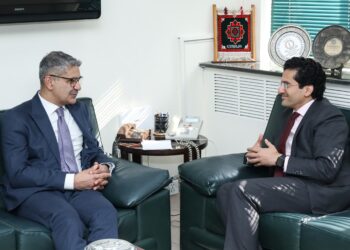ISLAMABAD Prime Minister Shehbaz Sharif on Sunday announced that the government is exploring ways to avoid increasing electricity tariffs through rebasing for the financial year 2025–26.
He was speaking at the official launch of the “Apna Meter, Apni Reading” (Own Meter, Own Reading) mobile application in Islamabad, terming it a revolutionary step toward transparency and consumer empowerment in the power sector.
The Prime Minister emphasized that the app is a transformative governance reform designed to empower electricity consumers, reduce overbilling, and bring transparency to the billing process. The app allows consumers to take a photo of their electricity meter on a specified date and submit it via the app—ensuring their bills are based on actual usage.
“This technology-driven initiative will significantly curb issues such as overbilling, incorrect readings, and billing delays,” he said, adding that the app has been launched in five languages to promote national unity and facilitate usage across all provinces. He also directed that the app be rolled out nationwide, from Peshawar to Karachi.
Prime Minister Shehbaz highlighted broader reforms in the power sector, including the revamping of DISCO boards, merit-based appointments, and action against corruption.
He reiterated the government’s commitment to promoting solar energy, calling it the cheapest and most sustainable source of power. “I will not discourage solarization; it is the future. Pakistan is among a handful of countries where the adoption of solar energy is accelerating rapidly,” he said.
Addressing concerns around the potential electricity tariff hike, the Prime Minister assured that the government is working hard to prevent any increase in rates for for FY2025-26.
“There were fears that tariffs might increase by 50 to 70 paisas per unit. I held detailed meetings with my team and directed them to explore ways to avoid this burden on the public. We’re working diligently so this increase doesn’t reach the people,” he sta
In a major relief for consumers, the Prime Minister announced the abolition of the PTV fee from electricity bills, a longstanding demand by the public. “This is part of our commitment to ease the financial burden on the common man,” he added.
The Prime Minister also acknowledged that the country faces massive power theft of Rs 500 billion annually as well as surplus electricity and the need to reduce losses swiftly. “This is a four-front battle: bringing cheap electricity, addressing surplus generation, discouraging theft, and ensuring affordability for both industrial and domestic users,” he said.
He praised the efforts of Federal Minister for Power Sardar Awais Leghari and his team, stating that hard negotiations with Independent Power Producers (IPPs) had led to significant relief.
“Out of the Rs 7.5 per unit reduction in electricity rates, Rs 4.5 is the result of our successful talks with IPPs,” he said
The “Apna Meter, Apni Reading” app allows consumers to: (i) submit a photo of their meter reading on a designated date ;(ii) ensure bills are calculated using their submitted reading, not the one taken by the meter reader afterward ; and (iii) avoid losing subsidies by staying under consumption thresholds. For example, crossing 200 units can lead to a jump in bills from PKR 2,330 to PKR 8,104.
This innovation will benefit millions, particularly those receiving government subsidies, and reduce dependency on meter readers—cutting down human error and manipulation. Ends















